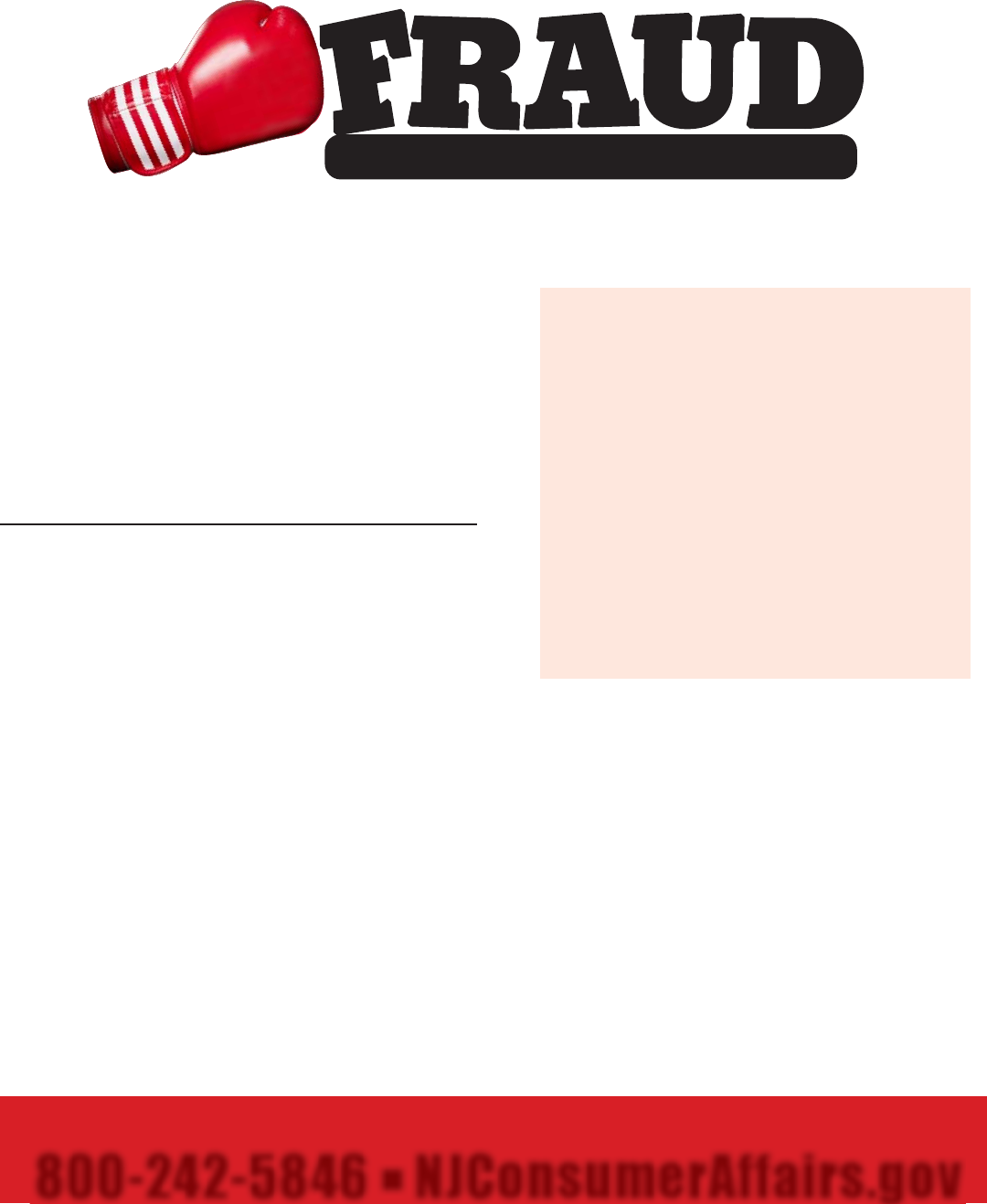
NEW JERSEY DIVISION OF CONSUMER AFFAIRS
FIGHTING
F
R
A
U
D
800-242-5846
NJConsumerAffairs.gov
Be an Informed Consumer …We can Help!
Identity theft – the misuse of one’s personal and financial
information by a criminal who steals money from the
victim’s accounts or takes out loans in the victim’s name,
leaving the victim in debt – can cause very real heartache
and aggravation for its victims.
But there is good news. The U.S. Justice Department,
Bureau of Justice Statistics, found that victims of identity
theft can resolve the financial and credit problems that
result from this crime. The majority of victims were even
able to resolve these issues in less than one day, once they
became aware of the crime and took concrete action.
WHAT CAN YOU DO?
All New Jerseyans who believe they were exposed to iden-
tity theft – whether through a data breach, a phishing
scam, or the theft of their passport or other documents –
can take the following steps for self-protection.
■ File a complaint with the Federal Trade
Commission at www.ftc.gov/complaint or
877-438-4338. Your completed complaint is
called an "FTC Affidavit." You will want to bring
a copy of the FTC Affidavit to your local police
department; see Step 2.
■ File a report with your local police department,
and bring the police a copy of your FTC
Affidavit. Once your police report has been filed,
request a copy so it will be available to send to
credit reporting agencies and creditors.
If You Become a Victim of Identity Theft
Continued on back
■ Obtain a copy of your credit report from all three
credit reporting agencies. Contact them at:
Equifax Credit Information Services
Consumer Fraud Division
(800) 525-6285 • www.equifax.com
Experian
(888) 397-3742
www.experian.com/consumer
Trans Union
Fraud Victim Assistance Department
(800) 680-7289 • www.tuc.com
Tell these credit reporting agencies that you
suspect you were exposed to identity theft, and
ask that all of your accounts be flagged with a fraud
alert. This will alert any creditors, in case an
identity thief attempts to obtain a credit card or
loan in your name.
■ Keep a close watch on the activity on your credit
or debit cards. Many card issuers offer online
account access. If you can, check the accounts
daily. If you are unable to access this information
online, call the numbers on the back of the
affected cards.

800-242-5846
NJConsumerAffairs.gov
Be an Informed Consumer …We can Help!
■ Contact all credit card companies, creditors, banks,
and any financial institutions with which you do
business. Close the affected credit card and bank
accounts, and get replacement cards with new
account numbers. Change any passwords on the
accounts, including PINs. Follow up all telephone
contact with a written confirmation.
■ Contact the United States Social Security
Administration at:
Social Security Administration
Social Security Fraud Hotline
P.O. Box 17768
Baltimore, MD 21235
(800) 269-0271
TTX: (866) 501-2101
www.ssa.gov/oig/hotline
■ Keep a complete set of records. Keep a log with
notes on all telephone conversations with credit
reporting bureaus, creditors, or debt collection
agencies. Confirm all telephone conversations in
writing. Keep copies of all paper or electronic
correspondence you send and receive related to
the suspected identity theft. Send correspondence
by certified mail, return receipt requested. Keep a
record of the time spent and any expenses you
incurred, in case it one day becomes possible
to claim restitution in a judgment against the
identity thief.
■ You can also contact nongovernmental nonprofit
groups established to provide assistance to victims
of identity theft. For example:
Identity Theft Resource Center
(888) 400-5530
www.idtheftcenter.org
AN ADDITIONAL WORD ABOUT DATA BREACHES
Several companies affected by recent data breaches have
offered free credit monitoring services to affected
consumers. Consumers should consider taking advantage
of these offers – but should first take the time to verify
that any communication about such an offer is genuine.
Scammers have been known to contact consumers by email
or phone, while pretending to offer information and help
about a data breach. Their motivation is to fool
unsuspecting consumers into downloading computer
viruses, sending money, or giving away their personal
information.
The best self-protection is to verify any suspicious email
with the purported sender, through a separate medium
such as a phone call. If there is any doubt about a message,
simply delete it.
